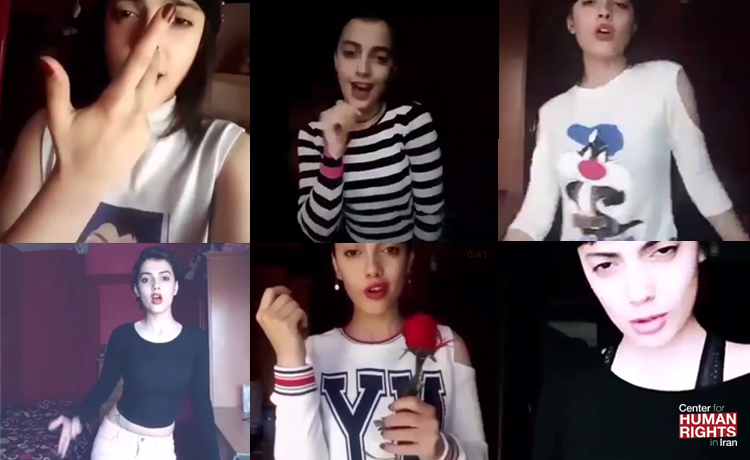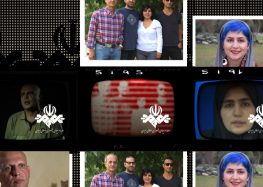Iran’s Forcing of Teenage Girl to Confess on State TV for Posting Dance Video Prompts Strong Outcry

Authorities Ramp Up Crackdown on Social Media
July 9, 2018—Forcing a teenage girl to confess on state TV for the “crime” of posting a video of herself dancing on Instagram represents a blatant violation of freedom of expression and demonstrates the extent to which the authorities are brutally imposing their cultural dictates on the people of Iran. The Center for Human Rights in Iran (CHRI) condemns the Iranian authorities’ arrest and inhumane treatment of 18-year-old Maedeh Hojabri.
Hojabri and an unknown number of other social media users were arrested at an unknown date. Her forced “confession” was aired on state TV on July 7, 2018. Crying, the distraught teenager explains that she posted videos of herself dancing on her Instagram account for her followers and was not directed by anyone.
“The government has left no space for Iranians to breathe. It wants to control the clothing they wear, the music they listen to, the books they read, the movies they watch, and the way they live their lives,” said CHRI’s Executive Director Hadi Ghaemi.
“Despite this suffocating atmosphere and the threat of imprisonment, people continue to express themselves and protest these restrictions,” added Ghaemi.
Forced “confessions” in politically motivated cases in Iran are often extracted under the threat of or actual torture and then broadcast by the state-run Islamic Republic of Iran Broadcasting (IRIB) to justify politically motivated prosecutions.
No charges have been announced in Hojabri’s case but the day her forced confession was aired, the head of Tehran’s cyber-police Touraj Kazemi announced that people who post “indecent” material online would be pursued for committing crimes against national security.
There has been widespread outcry over the arrest of Hojabri and the other detainees among Iranians in Iran and abroad, by artists, journalists, activists, politicians and thousands of ordinary citizens on social media.
Zahra Rahnavard, the opposition Green Movement leader who has been under house arrest in Iran without charge for over seven years was quoted by the Kaleme website as saying, “The head of the IRIB should apologize to the shared conscience of the people of Iran. In its dreadful interview, the IRIB displayed how it shredded the spirit of a young girl. For how long do we have to witness such behavior against humanity and youthfulness?”
Instagram is the only widely used social media app that hasn’t been banned in Iran. The state banned the popular Telegram messaging app in May 2018 and Facebook and Twitter in 2009.
Dancing is considered a sin in Iran according to article 638 of the Islamic Penal Code: “Anyone in public places and roads who openly commits a harām [sinful] act, in addition to the punishment provided for the act, shall be sentenced to two months’ imprisonment or up to 74 lashes; and if they commit an act that is not punishable but violates public prudency, they shall only be sentenced to ten days to two months’ imprisonment or up to 74 lashes.”
On July 8, Iran sentenced Shaparak Shajarizadeh, 42, to two years in prison and 18 years probation for peacefully protesting Iran’s compulsory hijab law by removing her veil in public.
In September 2014, seven young people were sentenced to prison time and flogging, sentences that were later reduced upon appeal, for producing a video of themselves dancing to Pharrell Williams’ “Happy” at different locations in Tehran.
“The government’s intolerance and disrespect of Iranians’ choice of lifestyle is indicative of a lack of freedom in the country that has reached a new low in the past few months with the attack on social media personalities,” said Ghaemi.






